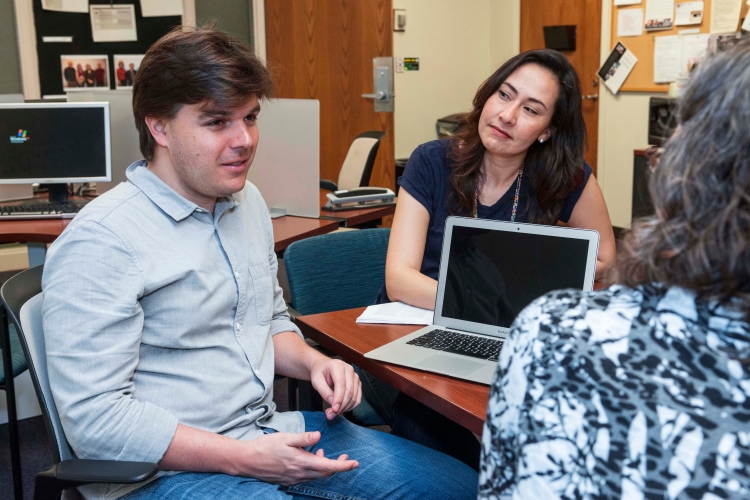
By Sean Smith | Chronicle Editor
Boston College’s innovative international doctoral program in social welfare, built around a partnership arrangement with Jesuit universities in Mexico and South America, is comfortably in stride mid-way through its second year of operation.
The first two students to enroll in the program – both from Mexican universities – are on the BC campus this academic year, with a second cohort slated to arrive in the fall and a third to be admitted shortly.
“We are very pleased with the progress thus far,” said the program’s director, Louise McMahon Ahearn Professor James Lubben of the Graduate School of Social Work, which houses the program. “Interest in the program at our current partner universities is very high, and several more Jesuit institutions in Latin America and Spain will be joining the partnership, or have expressed interest in doing so.
“This new program in social welfare has created a tremendous excitement in part because it fosters what could be called ‘brain exchange’ rather than the all-too-typical pattern of ‘brain drain.’ That is, the program promotes partnerships that assist in the building of intellectual capital in both countries focused on social welfare – as opposed to luring intellectual talent to the US at the expense of the sending country.”
Established in the summer of 2011, the international doctoral program in social welfare – funded through an agreement with Santander Universities, the philanthropic arm a part of Spain-based Banco Santander – enables BC to form partnerships and exchanges with Jesuit, Catholic universities worldwide to advance and professionalize the field of social welfare. The program offers research-driven knowledge, experience-based insight, and field-tested skills to address the unique issues faced by students’ respective countries or communities.
During the first year, participants study at the partner university and take two online courses from BC. The second year is spent entirely at BC, while the third and fourth are split between BC and the partner university. During this period, students make the transition from taking formal courses to producing scholarly material, with focus on writing a publishable paper. The fifth year (and if necessary, sixth year) is spent completing a final dissertation that deals with a social problem in his or her home country.
The program’s first enrollees, Ana María Vázquez from ITESO in Guadalajara and Pablo Gaitán Rossi from Universidad Iberoamericana, said they have benefited from their experiences thus far, especially the opportunity to study at BC and to learn about social welfare in the US.
“If I have to pick among the many things I’ve learned about social welfare in the US, I would say the research-driven social policies,” said Rossi, who has degrees in psychology and sociology and teaches in the social sciences. “I admire how policy is argued with research facts and then evaluated with rigorous techniques. The research culture and the way it is guided towards its policy implications is something I would definitely want to take back home.”
Vázquez, an international relations teacher whose scholarly interests include theories of international relations, peace studies, human rights and conflict resolution, said, “I’ve learned a lot more about how policy and social issues related to welfare and well-being are studied, designed and debated in this country. This has contributed to my understanding of the field in general.
“It’s useful to look at my own country from here, and re-frame questions that I had about how we conceptualize social work issues, welfare concerns, and the alternatives to improve people’s well-being.”
Lubben said the students’ comments underscore a key facet of the program: introducing an area of scholarship still relatively new to Latin America, a region undergoing a significant political transition.
“Scientific approaches to social welfare are inherent in democratic forms of government, whereas totalitarian governments view social welfare as largely an arena for patronage appointments and power brokerage,” he explained. “BC can play an important part in this exciting moment in the histories of these emerging democracies.”
Lubben adds that, however much Vázquez and Rossi may gain from their sojourn at GSSW, the school also benefits from their presence.
“They have already had a great impact on the traditional GSSW doctoral students. Both sets of doctoral students have had their visions of social work and social welfare expanded by the cross-national exchanges fostered through the program.
“Furthermore, the program is constructing a foundation that should enable the current and future graduates to continue their cross-national ties well beyond the time that they are students at BC. Indeed, they will be part of a new community of social welfare scholars bridging the countries of the Americas.”
Meanwhile, Oscar Martínez Martínez, a visiting professor from Universidad Iberoamericana in Mexico City, is at BC for 2013-14 to inaugurate the partnership’s faculty-exchange component.
Martínez said he feels fortunate to be able to learn about innovative aspects of social policy and social welfare through research being undertaken at GSSW.
“The academic level and impact of the research conducted in Boston College are recognized globally,” he said. “I was impressed by the access to various academic resources, such as journals and an extensive library collection, and the great academic infrastructure. I'm sure I will learn a range of skills that will aid my research as well as the content of the subjects I teach.



